Canmab 150mg Injection
$350.00 – $1,650.00Price range: $350.00 through $1,650.00
Canmab 150 is used to treat HER2-positive breast and stomach cancers. It contains Trastuzumab, which works by targeting the HER2 protein on cancer cells, slowing their growth and helping the immune system destroy them.
| Pack Size | Price | Price / Unit | Quantity | |
|---|---|---|---|---|
| 1 Injection | $350.00 | $350.00/ unit | ||
| 3 Injections | $1,020.00 | $340.00/ unit | ||
| 5 Injections | $1,650.00 | $330.00/ unit |
Looking for bulk / B2B pricing? | Send Inquiry |

| SKU | 11122 |
| Manufacturer | Biocon Ltd |
| Categories | Anti Cancer |
| Delivery Time | 10 - 14 Working Days |
| Strength | 150mg |
Introduction to Canmab 150 mg Injection
Canmab 150mg Injection is used in the treatment of breast and stomach cancer. It works by Killing the cancer cells by inhibiting HER2 (human epidermal growth factor receptor protein). Canmab 150mg Injection is given as an injection by a qualified medical professional.
Your doctor will decide what dose is necessary and how often you need to take it. This will depend on what you are being treated for and may change from time to time. You should take it exactly as your doctor has advised. Taking it in the wrong way or taking too much can cause very serious side effects.
This medicine is manufactured by Biocon Ltd. The mechanism of action of Canmab involves several pathways. Trastuzumab binds to the extracellular domain of the HER2 protein, preventing it from activating downstream signaling pathways that lead to cell proliferation.
Uses of Canmab 150 mg
Canmab 150 mg Injection, containing the active ingredient trastuzumab, is primarily used for the treatment of certain types of breast cancer and gastric cancer. Here are the main uses of Canmab 150 mg:
- HER2-Positive Breast Cancer
- HER2-Positive Metastatic Gastric Cancer
- Adjuvant Therapy in Breast Cancer
- Neoadjuvant Therapy in Breast Cancer
- Combination Therapy
How Does Canmab 150 Works?
Canmab 150mg Injection is a recombinant IgG1 monoclonal antibody. It works against the HER2 (human epidermal growth factor receptor protein) receptors which are responsible for the over-proliferation of cancer cells in breast cancer and stomach cancer cells. It destroys the cancer cells by inhibiting HER2. It also inhibits various cancer-causing downstream signaling pathways.
Side Effects of Canmab 150
Common Side Effects
- Infusion Reactions
- Gastrointestinal Issues
- Fatigue
- Respiratory Problems
- Skin Reactions
- Muscle and Joint Pain
- Infections
- Low Blood Cell Counts
Serious Side Effects
- Cardiotoxicity
- Severe Infections
- Severe Neutropenia
- Hypersensitivity Reactions
- Renal Toxicity
Dosages of Canmab
How to Manage Side Effects?
- Communicate with Healthcare Provider
- Pre-medication for Infusion Reactions
- Monitoring during Infusion
- Managing Infusion Reactions
- Avoiding Live Vaccines
- Neutropenia Management
- Gastrointestinal Issues
- Hepatotoxicity Management
Warning & Precautions
When using Canmab 150 mg Injection, it is crucial to be aware of various warnings and precautions to ensure patient safety and maximize the therapeutic benefits of the treatment. Here are the key warnings and precautions:
1. Cardiac Monitoring:
- Canmab has been associated with cardiotoxicity, including congestive heart failure and decreased left ventricular ejection fraction. Patients should undergo thorough cardiac evaluation before starting treatment, including echocardiograms or MUGA scans. Regular cardiac monitoring is necessary during and after treatment. Patients with pre-existing cardiac conditions should be closely monitored and may require dose adjustments or discontinuation of therapy if significant cardiac dysfunction occurs.
2. Pulmonary Toxicity:
- Canmab can cause serious lung problems, including interstitial lung disease and pneumonitis. Symptoms such as cough, shortness of breath, and chest pain should be reported immediately. Patients with pre-existing lung conditions may be at higher risk and should be monitored closely.
3. Hepatotoxicity:
- Liver function should be monitored regularly, as Canmab can cause liver damage. Symptoms such as jaundice, dark urine, and abdominal pain should be reported immediately. Patients with pre-existing liver conditions should be closely monitored and may require dose adjustments.
4. Bone Marrow Suppression:
- Canmab can cause bone marrow suppression, leading to neutropenia, anemia, and thrombocytopenia. Regular blood tests are necessary to monitor blood cell counts. Patients should report any signs of bleeding, bruising, or infections to their healthcare provider immediately.
5. Pregnancy and Breastfeeding:
- Canmab can cause harm to a developing fetus. Women of childbearing potential should use effective contraception during treatment and for at least seven months after the last dose. Canmab should not be used during pregnancy unless absolutely necessary. Breastfeeding should be avoided during treatment and for at least seven months after the last dose due to the potential for serious adverse reactions in nursing infants.
6. Renal Impairment:
- Patients with renal impairment should be monitored closely, as Canmab can cause renal toxicity. Symptoms such as reduced urine output, swelling, and fatigue should be reported immediately.
7. Patient Education:
- Patients should be educated about the potential side effects of Canmab and instructed to report any new or worsening symptoms to their healthcare provider. They should also be informed about the importance of regular monitoring and follow-up appointments.
Frequently Asked Questions
1. Is Hertraz 440mg Injection used as a monotherapy in treating breast cancer?
Hertraz 440mg Injection is generally given along with the chemotherapy medication such as paclitaxel or docetaxel or platinum compounds. Sometimes, it is also given with hormonal agents for those patients with elevated hormonal status.
2. Does Hertraz 440mg Injection cause heart problems?
Yes, Hertraz 440mg Injection can damage the heart muscles. Hence to prevent the worsening of symptoms, it is advised to do heart check up every 3 months and continue till 2-5 years after the treatment completion.
3. Can I breastfeed while on treatment with Hertraz 440mg Injection?
No, since tends to pass into breast milk, it is unsafe to breastfeed. Hence, It is advised not to breastfeed for a minimum of 7 months after the treatment with Hertraz 440mg Injection.
4. Can Hertraz 440mg Injection be used during pregnancy?
No, it is unsafe. It can harm the baby by reducing amniotic fluid and affecting organ development, like lungs. If planning pregnancy, discuss birth control options, as it may affect fertility.
| Pack Size | 1 Injection, 5 Injections |
|---|---|
| Price/Unit | $330/unit, $340/unit, $350/unit |
Be the first to review “Canmab 150mg Injection” Cancel reply
Related Products
Anti Cancer
Anti Cancer
Anti Cancer

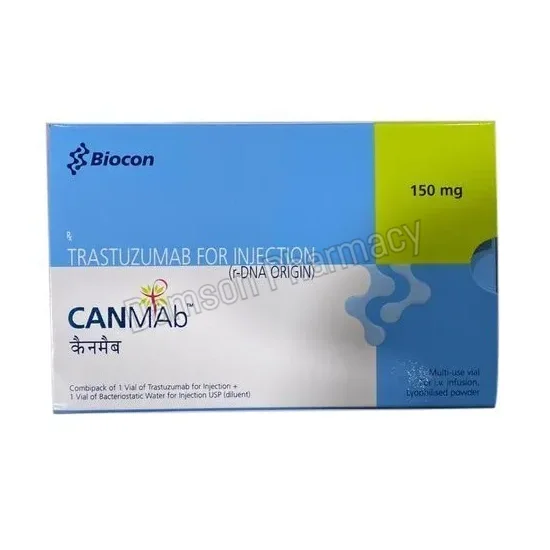
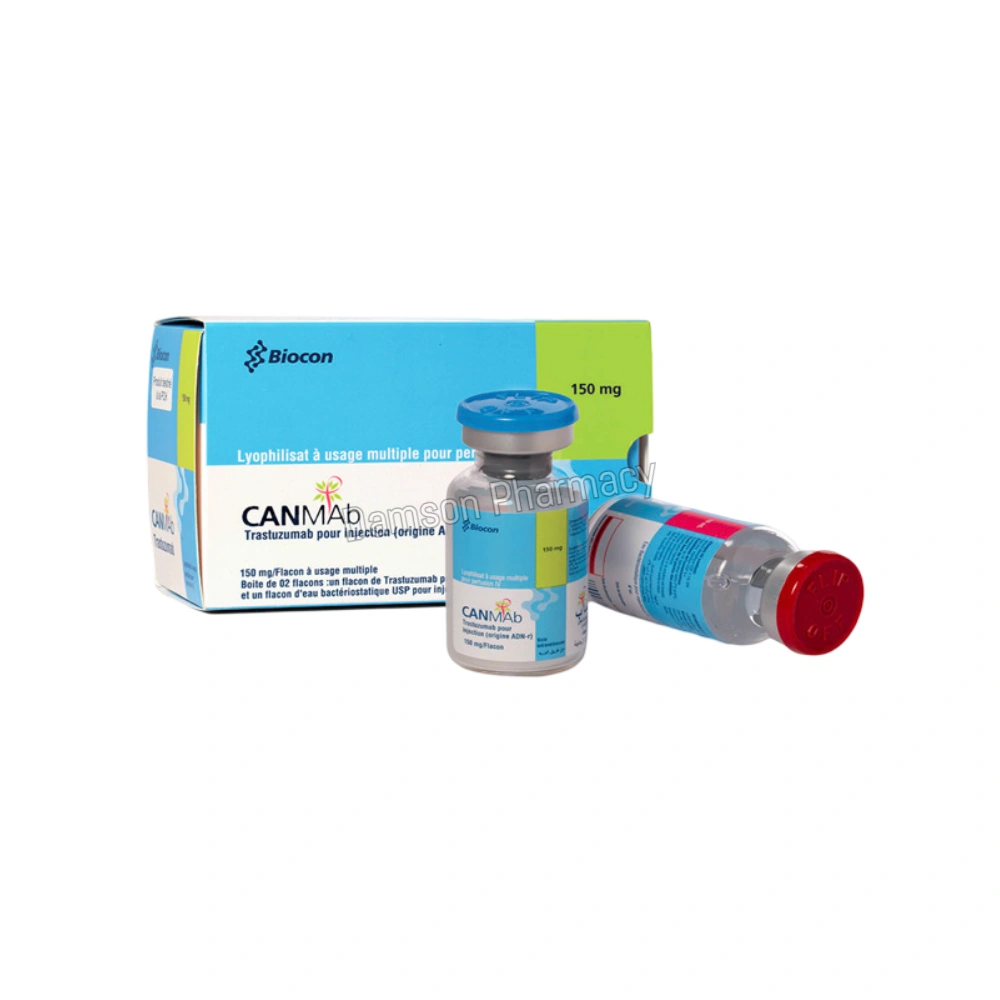

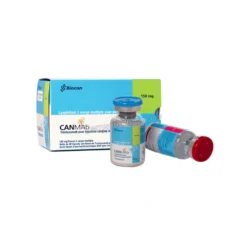
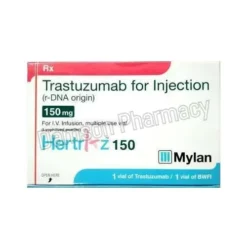
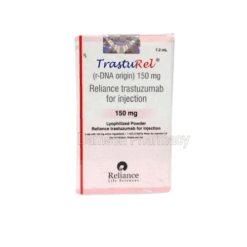
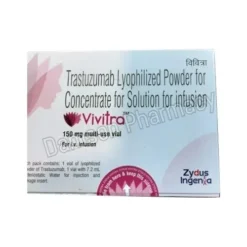
Reviews
There are no reviews yet.